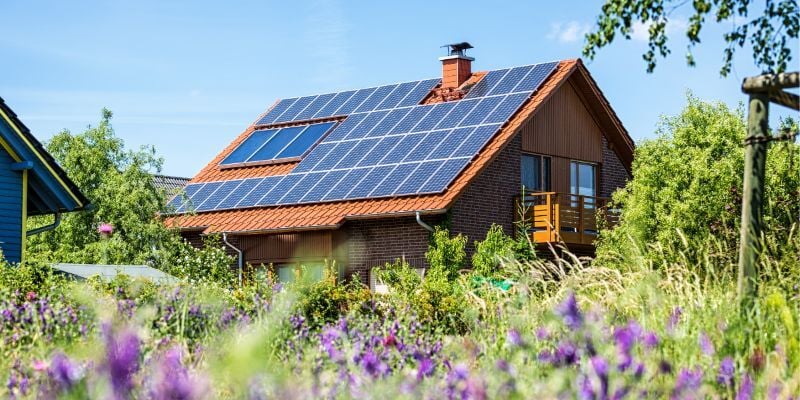Solar energy is clean, renewable, and an increasingly popular way to power homes across the UK - with more than 1.2 million homes now having solar panels installed.
By installing a solar panel system, you can improve the sustainability of your home, reduce your energy bills, and contribute to a healthier future for our planet.
However, when you start looking at the prospect of installing solar panels to your home, it can be easy to feel overwhelmed by the number of components you need to make a decision on.
To help you understand and make sense of what goes into your solar investment, we’ve put together this simple guide that explains the key components that make up a solar panel system.
But remember, although it always helps to have a top-level understanding of the components that are part of your solar panel installation - you don’t need to be an expert.
If you choose a reliable solar panel installation partner to manage your project, they will listen to your needs and requirements and carefully propose and explain the best solar panel system for your home.
Solar panels
The core part of any solar panel system is the solar panels themselves.
Each solar panel includes a number of photovoltaic (PV) cells, which are typically made from a semi-conductive material like silicon.
When the sun's rays hit these PV cells, the photons knock electrons loose from the silicon atoms, creating an electric current. This process is known as the photovoltaic effect.
What makes the choice of solar panels a little more complicated is that there are actually three main types of solar panels available in the UK market, each with its own distinct pros and cons.
Monocrystalline solar panels
Monocrystalline panels are made from single crystals of silicon. This purity means that they are typically more efficient than other panels - converting between 18%-24% of available sunlight into electricity.

They are also better at performing in low-light conditions and tend to have a longer lifespan. However, they are also more expensive than other types of panels.
Polycrystalline solar panels
Polycrystalline panels are made from multiple silicon crystals that have been melted together.
They are less expensive to manufacture than monocrystalline panels and offer a good balance between cost and efficiency.
However, they only convert between 13-16% of available sunlight into electricity and have a less sleek and uniform appearance compared to monocrystalline panels.
Thin film solar panels
Thin film solar panels aren’t commonly found on residential solar panel installations, but they are an option to be considered if you have a curved or steep-angled roof where mono or polycrystalline panels wouldn’t be viable.
Thin film solar panels are incredibly thin and flexible, but this comes at the expense of efficiency - with these panels only converting between 7-13% of available sunlight into electricity.
Whichever type of solar panel you choose, it’s important to understand that the electricity generated by the PV cells isn't immediately usable.
The direct current (DC) generated from your panels needs to be converted into alternating current (AC) before it’s suitable to power your home.
This is where a solar panel inverter comes in.
Inverter
A solar inverter is a really important component in your solar panel system, as it turns the DC current generated by your solar panels into alternating current (AC), which is the standard form of electricity used in homes and appliances.
There are three main types of inverters used in residential solar panel systems:
String Inverters
String inverters are the most common type of inverter used in solar panel installations.
They are named "string" inverters because they are connected to a series of solar panels, which are all connected and wired together. The combined DC current of the string of panels is sent to a single inverter, which then converts it to AC electricity.
String inverters are a cost-effective and reliable option, but their performance can be affected if one or more panels in the string are in the shade or aren't operating at their full efficiency. This can be overcome by installing optimisers on each panel.
Hybrid inverters
Hybrid inverters are a smart choice if you’re considering including battery storage as part of your solar panel system.
Hybrid inverters are able to manage the distribution of AC current for immediate use in your home at the same time as directing excess DC current into your storage battery.
This stored electricity can be used outside of daylight hours, improving your solar installation's efficiency and overall return on investment.
Fuse box and circuit breakers
Fuse boxes and circuit breakers are essential safety components in a solar panel system.
They help make sure that the electricity generated by your solar panels is safely distributed throughout your home and protect your electrical system from power surges.
During the solar panel installation process, an electrician will complete a review of your home's existing electrical system to make sure it’s compatible with your new solar panel installation.
In some cases, upgrading your fuse box or circuit breaker panel might be necessary - but the cost of this is often negligible, and you can’t put a price on peace of mind of knowing that your solar panel installation is safe.
Battery storage
Although not essential - if you’re considering a solar panel installation, it might be worth thinking about adding a battery storage system to your system.
Battery storage allows you to store the excess energy your panels generate during the day, so you can use it at night or whenever your panels aren't producing enough electricity to meet your needs.
With battery storage, you can make the most of the clean, renewable energy your solar panels produce - reducing your reliance on the grid. This can lead to additional savings on your energy bills, as you'll need to purchase less electricity from the national grid.
While solar batteries offer a lot of advantages, they do come with an additional upfront cost and may not be necessary for every household.
If you're interested in exploring whether a solar battery is the right solution for your home, it's a good idea to speak with your solar panel installation partner, who can provide tailored recommendations based on your needs.
Meters
When you install a solar panel system, you'll also need a meter to monitor the electricity you generate and use.
There are a variety of different meters available, but the meter we typically recommend at Projects4Roofing is a bi-directional meter.
A bi-directional meter measures both the electricity your solar panels generate for use in your home and the electricity you import into your battery from the grid - helping you keep tabs on the efficiency of your solar panel system.
If you’re part of the legacy Feed-in Tariff or the more recent Smart Export Guarantee, you’ll also need a smart meter to keep track of the excess electricity you generate and send back to the grid.
Smart meters are also great at providing more detailed information about your energy usage and can automatically send readings to your energy supplier.
Are you ready to embrace the power of solar energy?
Solar energy offers a clean, renewable, and cost-effective way to power your home.
By installing a solar panel system, you can reduce your carbon footprint, lower your energy bills, and gain greater energy independence.
Solar panel installations can be complex, and are made up of several key components.
While having a broad understanding of each of these components can help give you peace of mind when making decisions - when you choose the right solar installation partner, you really don't need to worry about the technical details.
At Projects4Roofing, our team of experts are here to guide you every step of the way.
We’ll listen to your needs, review your home's energy requirements, and design a custom solar panel system that's tailored to your specific situation and budget.
If you’d like to discuss whether solar battery storage is the right choice for you, get in touch with Projects4Roofing today!


